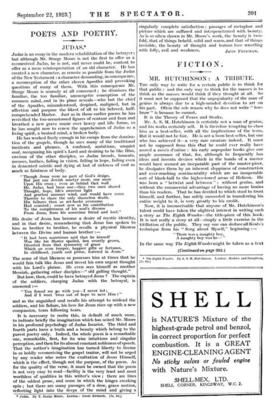POETS AND POETRY.
JUDAS.*
Judas is an essay in the modern rehabilitation of the betrayer ; but although Mr. Sturge Moore is not the first to offer us a reconceived Judas, he is not, and never could be, content to offer us a mere reinterpretation of an old character. He has created a new character, as remote as possible from the Judas of the New Testament : a character demanding, in consequence, a reconception of the other eleven Apostles and provoking questions of many of them. With this consequence Mr. Sturge Moore is scarcely at all concerned ; he dismisses the familiar, the too familiar, unenergetic conception of the common mind, and in its place reveals—who but the chief of the Apostles, misunderstood, despised, maligned, but in affection and purpose the likest of all to his beloved, half- comprehended Master. Just as in those earlier poems he has revivified the too-accustomed figures of centaur and faun and breathed a new grave music over heavy and idle forms, so he has sought now to renew the apprehension of Judas as a living spirit, a bruised mind, a broken body.
He has worked freely enough in his escape from the domina- tion of the gospels, though he uses many of the traditional incidents and phrases. A confused, ambitious, unquiet soul, recognizing his spirit's Lord and desiring to be like Him, envious of the other disciples, so Judas broods, laments, accuses, loathes, failing in vision, failing in hope, failing even in demented suicide and dying at last of sickness of soul as much as faintness of body.
" Though Jesus were no part of God's design, But just one Jewish martyr more, one more Upon His cross ; even as behind that wall He, Judas, had been one—they two once shared Thought, hope, life's sweetest light And gentlest summer wind, and would have conic Thereby to share the only shameless death. His failures then as set-backs overcome Had counted ; count now as his contribution To the completeness of his soul's divorce From Jesus, from his sometime friend and lord."
His desire of Jesus has become a desire of mystic identity,
and in that desire, remembering that Jesus has spoken to him as brother to brother, he recalls a physical likeness between the Divine and human brother :—
" It had been sometimes said that he himself
Was like his Master spoiled, less sweetly grown, Diverted from that symmetry of grace Which an even temper, happier gifts or fortunes, In childhood, youth and prime, fostered in Jesus."
The sense of that likeness so possesses him at times that he would fain talk like Jesus and invest his own urgent thought with his Lord's phrase. He even sees himself as another Messiah, gathering other disciples—" old galling thought." But how, then, could he have betrayed Jesus ? The captain of the soldiers, charging Judas with the betrayal, is answered :-
" You forced me go with you—I never led ;
And if I went 'twas out of hope to save Him I "
and as the anguished soul recalls his attempt to mislead the soldiers, and his failure, his love for Jesus rises up with a new compassion, tears following tears.
It is necessary to recite this, in default of much more, to indicate briefly the imagination which has seized Mr. Moore in his profound psychology of Judas Iscariot. The third and fourth parti have a truth and a beauty which belong to the purest poetry only. Indeed, the whole poem is a remarkable one, remarkable, first, for its wise intuitions and singular perception, and then for its almost constant nobleness of speech. That the author's imagination has turned liberty to license in so boldly reconceiving the gospel traitor, will not be urged by any reader who notes the exaltation of Jesus Himself, which is the effect, though not the purpose, of the poem. As for the quality of the verse, it must be owned that the poem is not very easy to read—facility is the very least and most worthless of qualities in this writer's view ; there arc lines of the oddest prose, and some in which the hinges creaking spin ; but there are many passages of a slow, grave motion, reflecting light into the deeps of the mind and giving a
• Judas. By T. Sturge Moore. London: Grant Richards. [7s. Gd.[ .
singularly complete satisfaction ; passages of metaphor and picture which are suffused and interpenetrated with beauty. As is so often shown in Mr. Moore's work, the beauty is two- fold, that of things beheld, solid and warm, and that of things invisible, the beauty of thought and human love wrestling






































 Previous page
Previous page